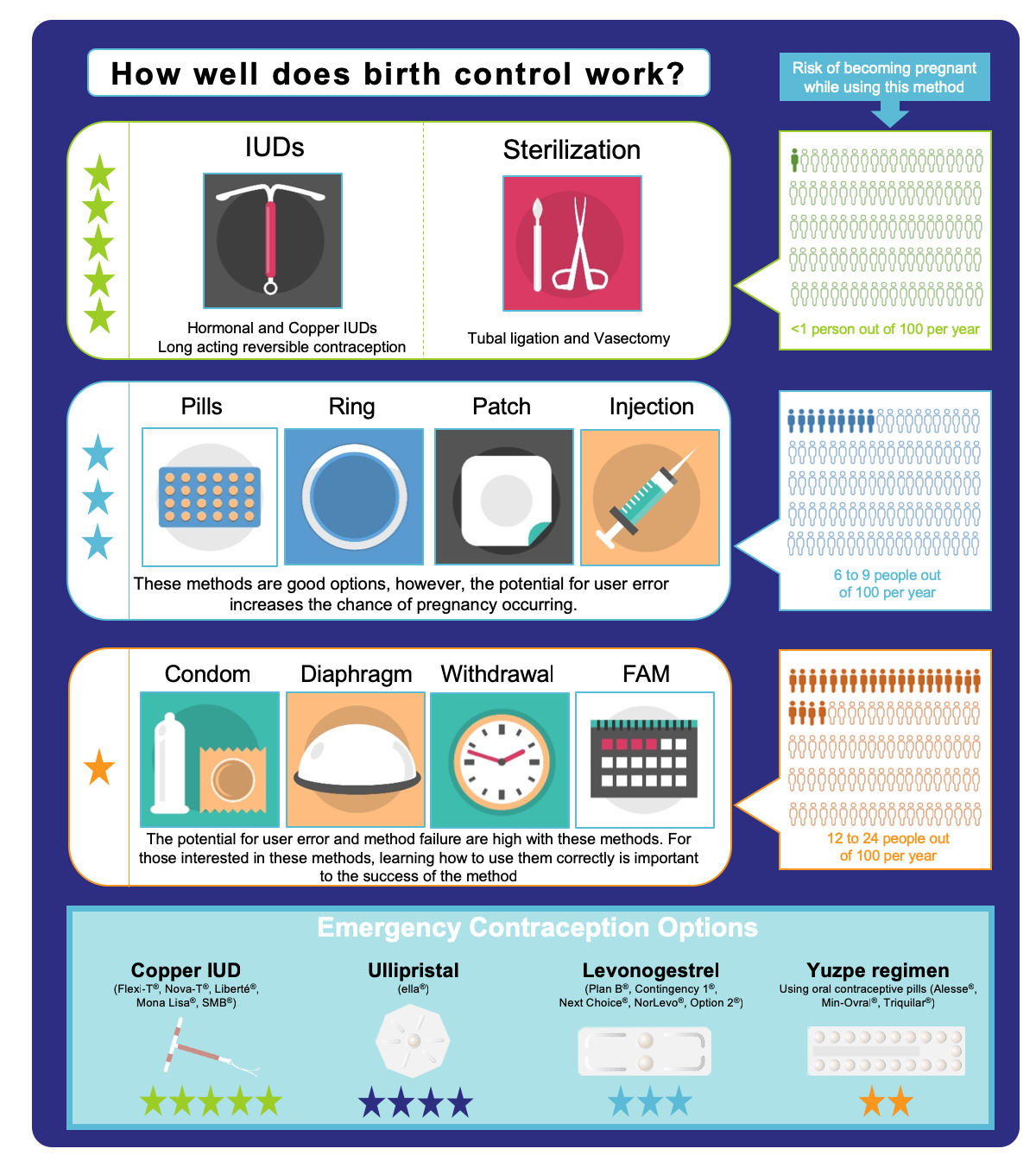Birth Control

(Image from Options for Sexual Health website, 2021)
What it is and How it Works
Birth control, or contraception, is a method of pregnancy prevention. Each methods falls into a category (barrier, hormonal, etc.), and each category is either reversible or irreversible. Barrier and hormonal methods of birth control are reversible meaning if you decide you want to have children, you may stop using or taking the birth control. Surgical sterilization is permanent and thus irreversible.
If you engage in sexual activity, no form of reversible birth control will completely prevent a pregnancy. Even sterilization is not 100% effective! That being said, using birth control as prescribed significantly lowers the risk of conceiving a child (see statistics in photo above and in "other methods" below). Abstinence – the choice to not have sex – is the only method that is 100% effective.
Different Types and Methods
Barrier methods are physical or chemical barriers that block the sperm from reaching the egg in the ovaries. These are typically made of latex, polyurethane, or nitrile. Because they hinder contact with sexual fluids, they can also effectively prevent transmission of sexual diseases.
- Penis condoms
- Vaginal/anal condoms
- Spermicides
- Diaphragm (cervical cap)
- Sponge
Hormonal methods use the hormones estrogen and progestin to change the hormonal cycle and hinder ovulation (the release of an egg from the ovary). These are typically prescribed to women since the medicine targets the ovulation cycle.
This happens in three different ways: preventing eggs from being released from the ovaries, thickening cervical mucus to prevent sperm from entering the uterus, or thinning the lining of the uterus. No method of hormonal birth control protects against sexually transmitted infections or diseases.
- “The Pill” or oral contraceptives
- Injection or the “shot”
- Implant
- Skin patch
- Vaginal ring
Intrauterine Contraception (IUD) - a small T-shaped device that is placed inside the uterus by a doctor and can remain for 3-6 years (99% effective)
Emergency Contraception - a copper IUD inserted within five days of unprotected sex or emergency contraceptive pill taken within 72 hours (three days) of unprotected sex (75-85% effective)
Fertility Awareness - tracking the menstrual cycle so you know when are ovulating each month (76-88% effective)
Withdrawal - pulling the penis out of the vagina before ejaculation (78% effective)
Which One is the Best?
Depending on your body, your partner, if you’re older or younger, and other factors, each birth control method will affect you differently. Your preferred method of choice could even effect you differently over time!
You have to choose the method that works best for YOU.
If you are curious, schedule a “What the Health?” advising session at the Health Education and Promotion Center on campus to learn the basics or talk with your doctor.
If you do talk with your doctor, ask yourself the following questions before and during your visit:
-
Concerning you and your sexual activity
-
What is my current health condition?
-
Do I want to get pregnant sooner in life, later, or never?
-
How often do I have, or want to have, sex?
-
How many sex partners do I have or plan to have?
-
-
Concerning birth control
-
What are the side effects of each type?
-
How well does each method prevent pregnancy?
-
Will I be able to use it correctly each time?
-
Do I need protection from sexually transmitted diseases as well?
-
![]()
For more information about birth control, visit:
Center for Disease Control and Prevention (CDC) - Contraception
Planned Parenthood - Birth Control
Office on Women's Health - Birth Control Methods
My Health Finder - Choose the Right Birth Control

